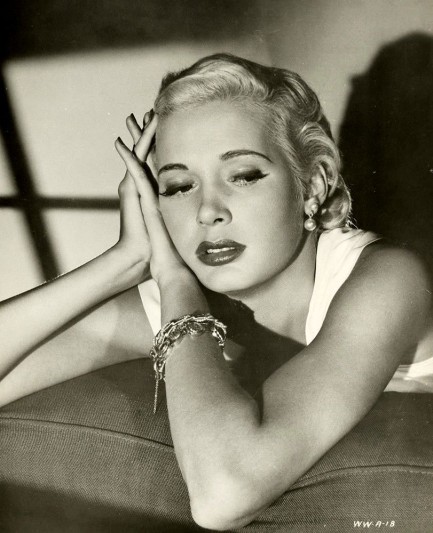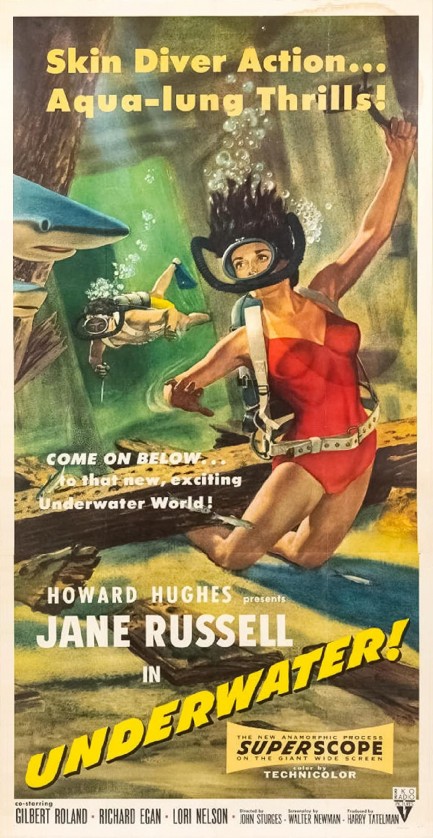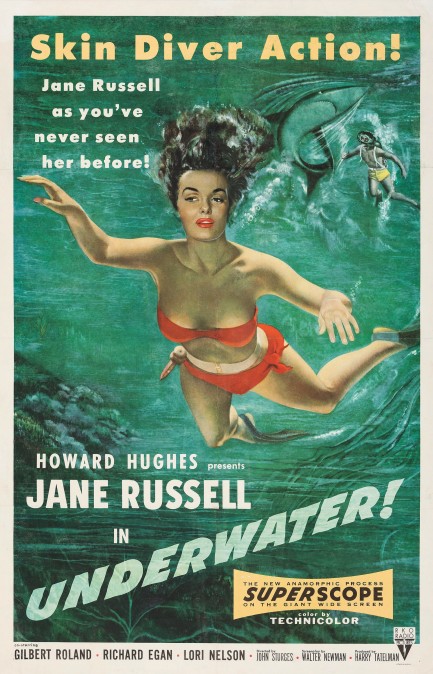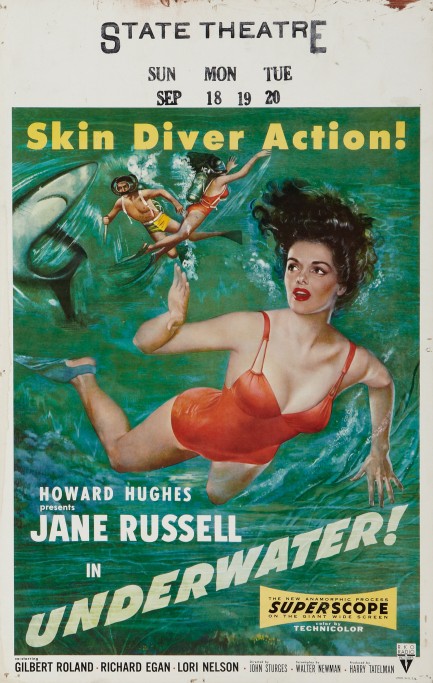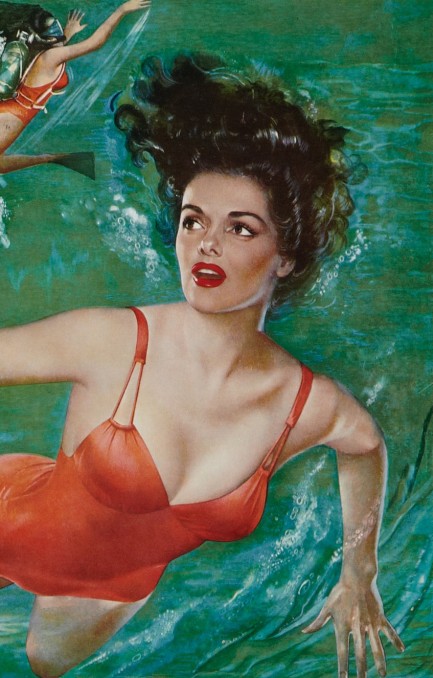 Russell sets the screen aflame in one of her iconic roles. 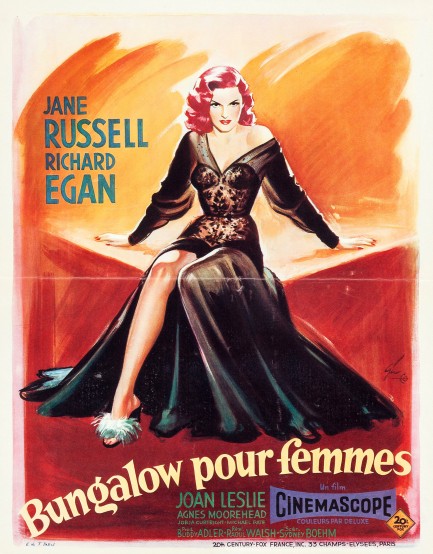 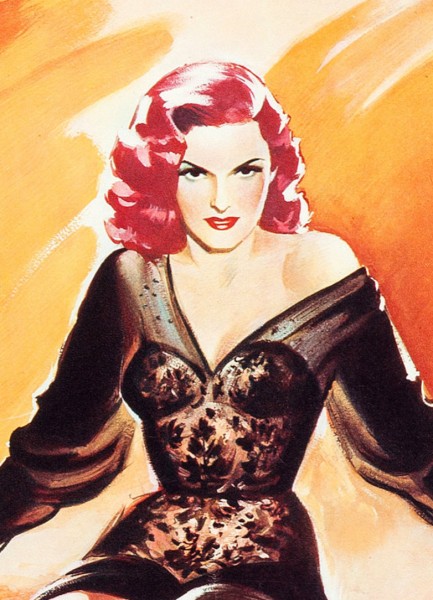
This French promo for The Revolt of Mamie Stover, which opened in Paris today in 1956 after being retitled Bungalow pour femmes, is yet another fantastic effort from the brush of Russian illustrator Boris Grinsson. Jane Russell starred in the film, and we especially like the poster's emphasis on her red hair. We talked about Mamie Stover as well as its complicated source novel last year. Check here for the movie and here for the book. We'll put together a larger collection on Grinsson later.
 By whatever means necessary. 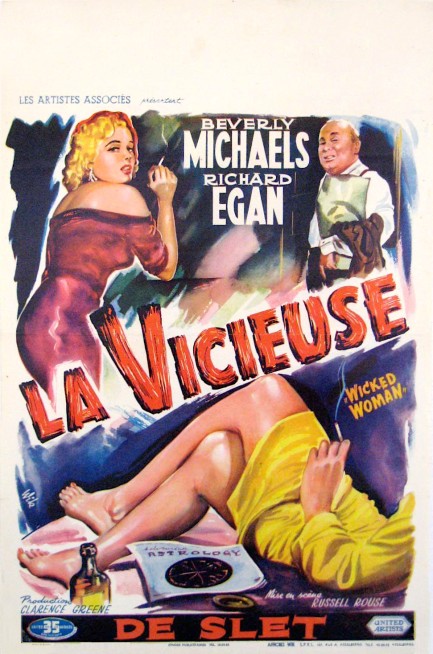
Above is a Belgian poster for the 1953 film noir Wicked Woman, originally made in the U.S. starring Richard Egan and, in one of her classic femme fatale roles, Beverly Michaels. Generally, because of the predominant languages used in Belgium, posters from there carried both French and Dutch text. In French Wicked Woman was titled La vicieuse, and in Dutch it was De slet (you can guess what that means). Our header for this post is a play on the never ending debate over whether film noir is a genre or a cycle. Either way, what it produced was always vicious. We briefly talked about Wicked Woman some years ago and shared the U.S. poster. This effort is from the presses of S.P.R.L. Belgique and it's signed by Wik, an artist who remains a mystery. Below, you see Michaels pondering the wickedness of her behavior and deciding she's fine with it.
 Touch a hot Stover and you'll get burned. 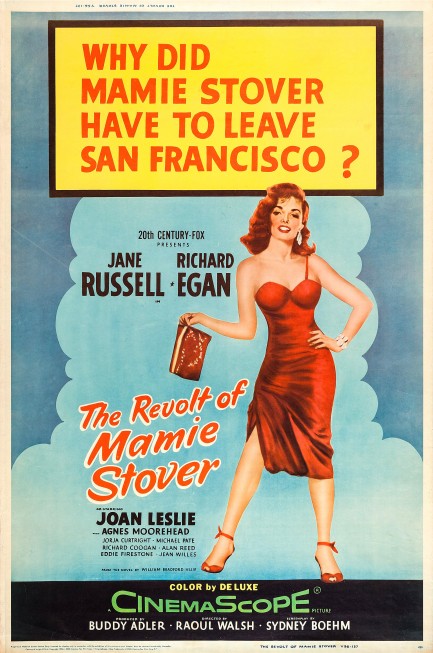
Above is a promo poster made for the Jane Russell drama The Revolt of Mamie Stover, which premiered in Honolulu today in 1956, and was sourced from William Bradford Huie's novel, a book we discussed at length some months back. The movie was directed by Raoul Walsh of Casablanca fame. He's properly credited on the above art, but for some reason on the second poster, which you'll find below, his name appears as Walsh Raoul. It's a weird mistake to get past so many studio eyes, but things like that happen, we guess. The U.S. art is uncredited, but the third poster, also below, was made for the film's British release and that was painted by Jock Hinchcliffe. He wasn't a noted stylist whose work is especially sought after today, but he did paint numerous posters, and he signed the piece below. Anyone who did that gets singled out here, because so few artists were credited by the studios.
Regarding the movie, needless to say, the challenging themes of Huie's novel were turned on their head by Hollywood. Mamie is no longer a racist toward Hawaiian islanders—in fact, the one islander character who gets to speak is bigoted against her. And she's no longer a prostitute but a hostess who induces men who frequent Honolulu's Bungalow Club to buy more booze and pay extra for private time. That private time takes place in a rattan decorated sideroom, but there's no bed evident. Instead there's a table and two chairs, so apparently men pay just to chat with Mamie, and the other women at the club. There's a sexual implication, but of the barest sort, because obviously Twentieth Century Fox could not have made a movie about Jane Russell prostituting herself 51,840 times—the exact number given in the book.
The Revolt of Mamie Stover is another example of suppressed sexual themes during the mid-century era, which is a big reason why we extend our purview at Pulp Intl. into erotic films and imagery—because in our era the previously unshown can be shown and openly examined. We've discussed this before. If you watch the movie, it's interesting to ponder the presumed maturity of book readers, who were asked point blank to consider a prolific prostitute the protagonist of the story, as opposed to cinemagoers, who were never presented with the possibility. In any case, the screen version of Stover, while not a sex worker, is at least a very knowing character, and Russell certainly has the sneer needed to pull off portraying a romantically cynical money worshipper determined to reach the top tax bracket no matter what it costs—her or others.
We figure anyone who has what it takes to get rich for simply, er, chatting with men deserves wealth, and indeed Mamie gets her money. That's not a spoiler, because it's never in doubt. It's part of the revolt—her resistance against forced membership in the underclass. The question is whether she can retain her newly gained higher status, and whether she can preserve the love she's stumbled upon along the way, because in American cinema moneyseeking characters must choose between their fortunes and their souls. That choice is supposed to supply the drama, but we think the movie is more interesting for its proto-feminist feel and class discussion. It's pretty good on all fronts, though, except that co-star Richard Egan is a bit of an empty shell. But he doesn't ruin it. How can he? He has Russell to carry him the entire ninety-three minutes.
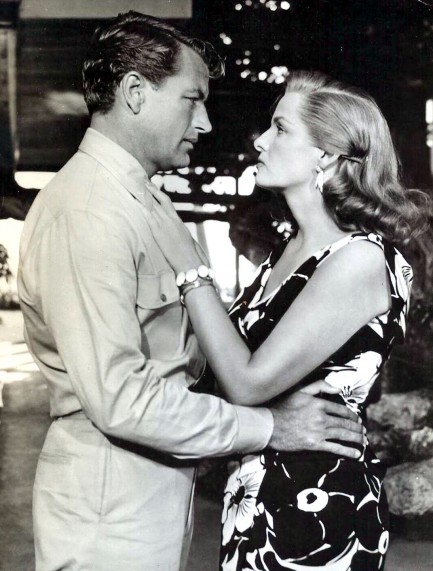 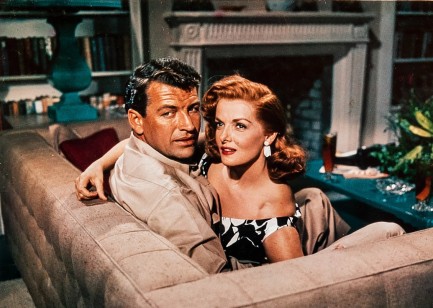 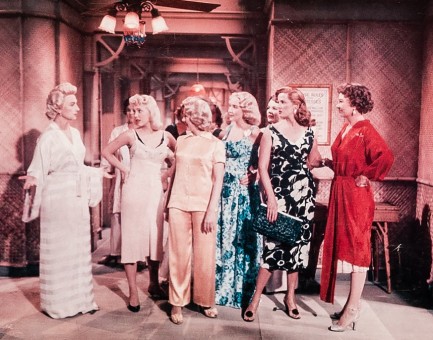 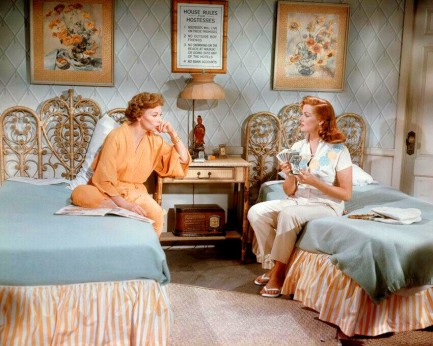 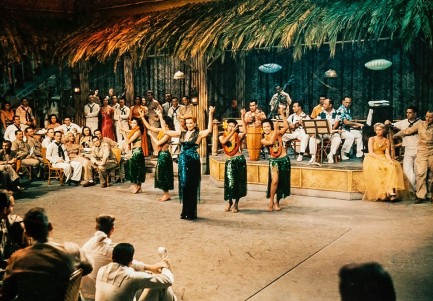 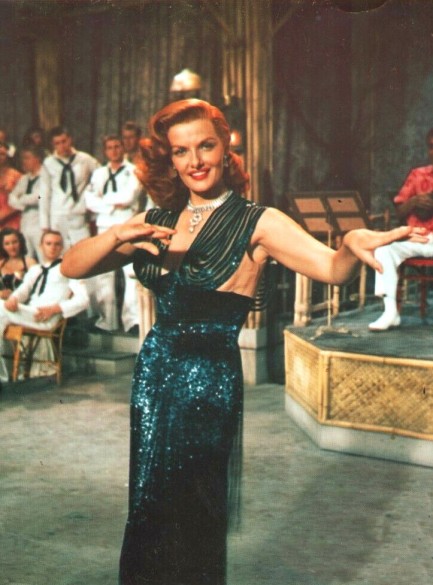 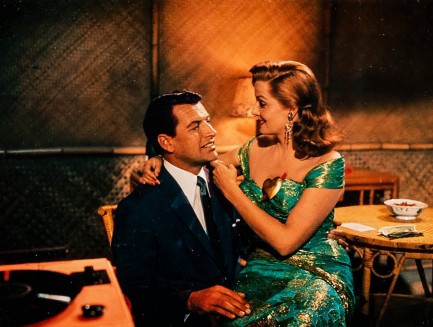 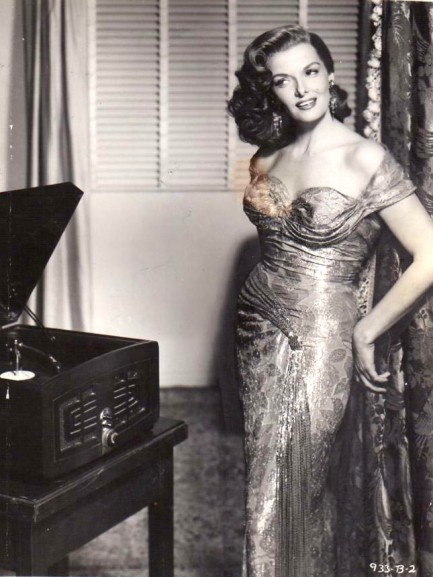 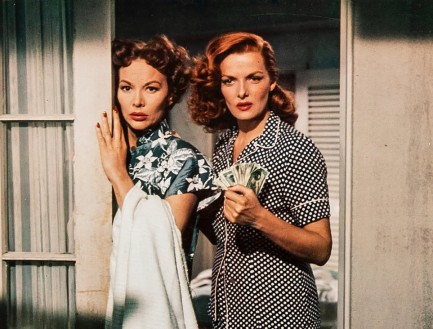   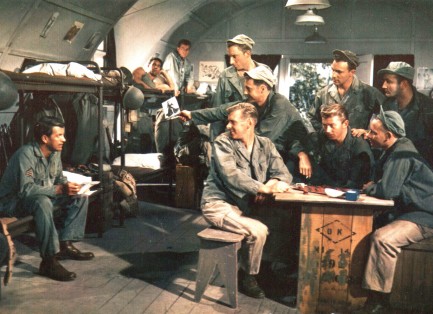 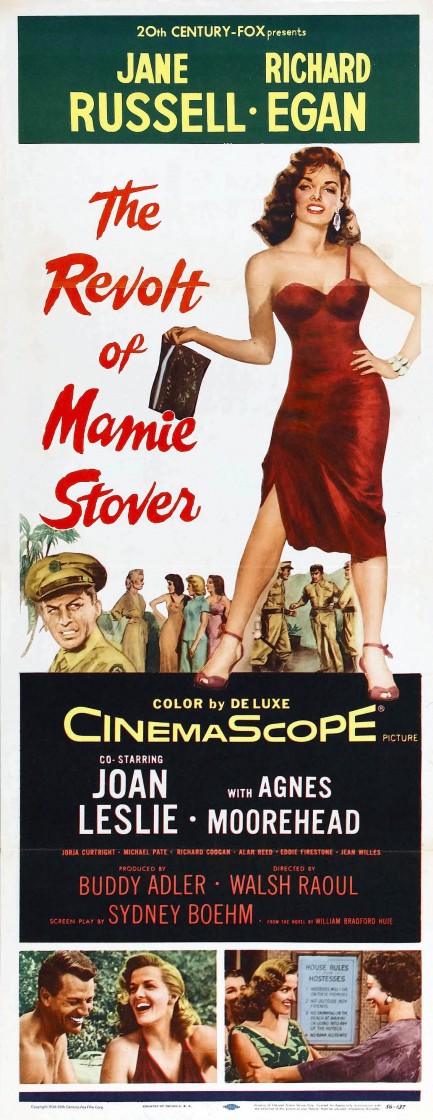 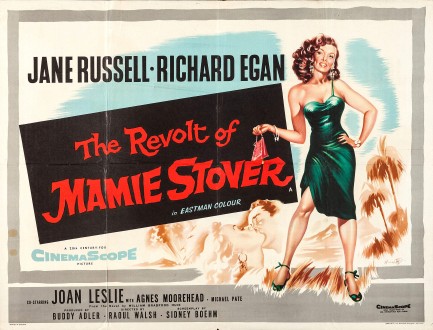 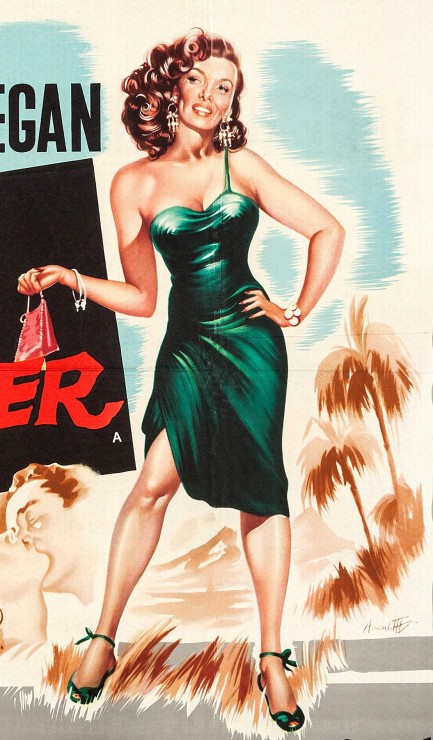
 The tune tells the whole tale. 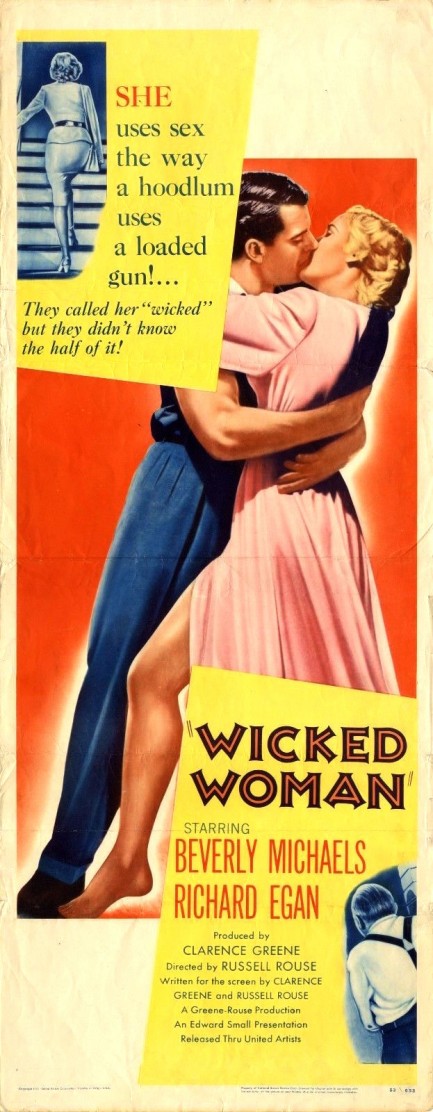
We love when the opening song of a movie tells you everything you need to know about the main character. Wicked Woman stars legendary b-movie femme fatale Beverly Michaels, and here are some choice lines from the intro theme, sung by crooner Herb Jeffries:
Why is a wicked woman a fascinating game, a thing a good man just can't leave alone? You know before you start it you'll end up broken hearted, but still you're like a moth to flame. What does a wicked woman have burning in her eyes that casts you in a spell you can't escape? You know that what she's doin' is sure to cause your ruin and still you listen to her lies...
Wicked Woman is pure cheeseball melodrama, but it's important because it established the icy cold Michaels blueprint that was copied in later movies—the lure, the scam, and the betrayal, all done unrepentantly. Michaels' fame derives not from acting ability, but from screen presence—i.e. she had that special it needed to play a femme fatale. In fact she's so bad you kind of root for her. Wicked Woman premiered in the U.S. today in 1953, and you can watch the whole thing at this link. 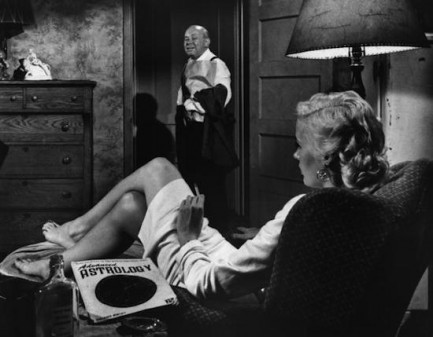 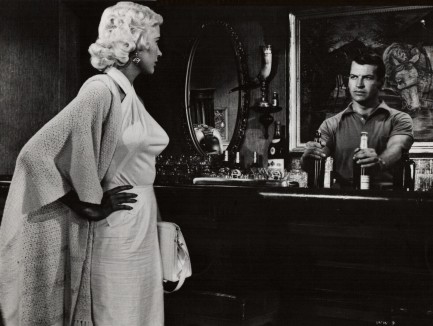 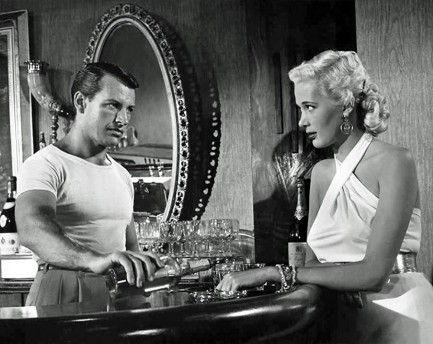 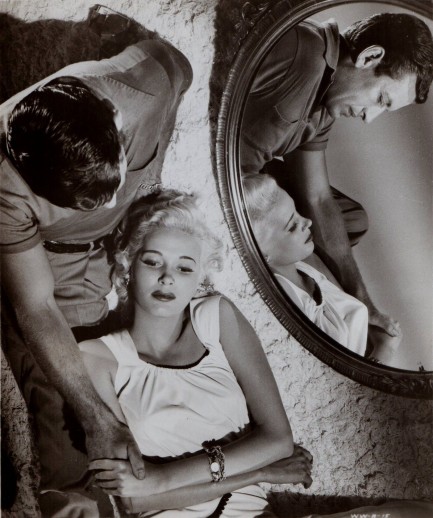 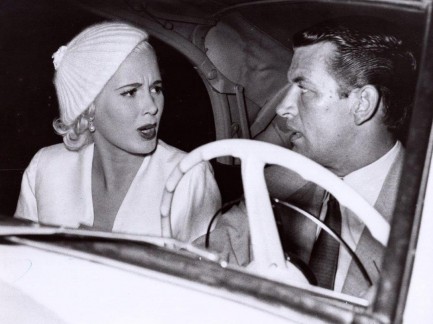 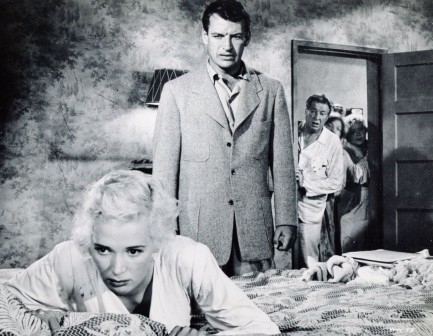 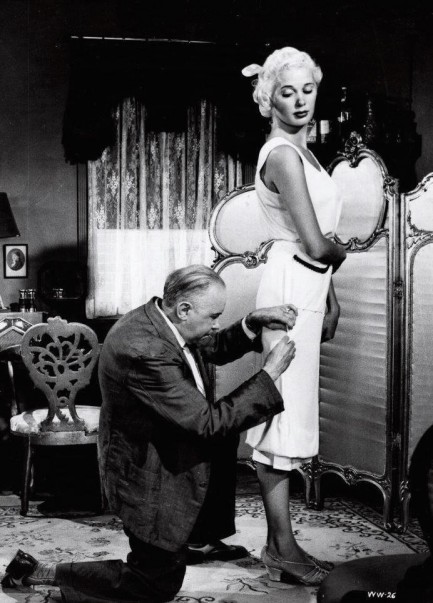 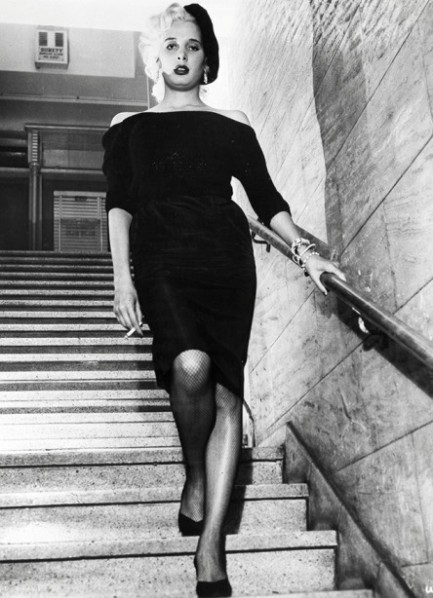
 The cops and robbers go coast to coast in Undercover Girl. 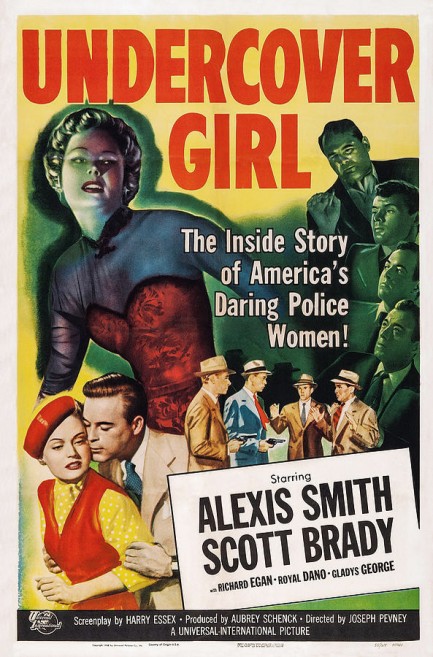
Above, a promo poster for Undercover Girl. The depiction of star Alexis Smith at upper left is modeled directly after the image of her we shared a couple of weeks ago, minus the pistol she was holding. Undercover Girl is about a rookie NYC policewoman detached to L.A. to pose as a Chicago drug buyer, and who joined the force to avenge her cop father’s death. Lucky, then, one of the drug dealers she’s going after was coincidentally responsible. We probably don’t have to tell you her cover is blown later in the film—it’s a standard feature of these deep cover dramas even today. It’s still worth a glance, though, and we’re glad we mixed it into the slate of five horror movies we watched this weekend. Undercover Girl premiered in the U.S. today in 1950.
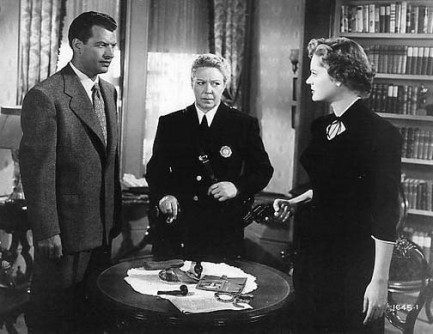
 Jane Russell heats up the tropical waters in treasure hunting adventure. 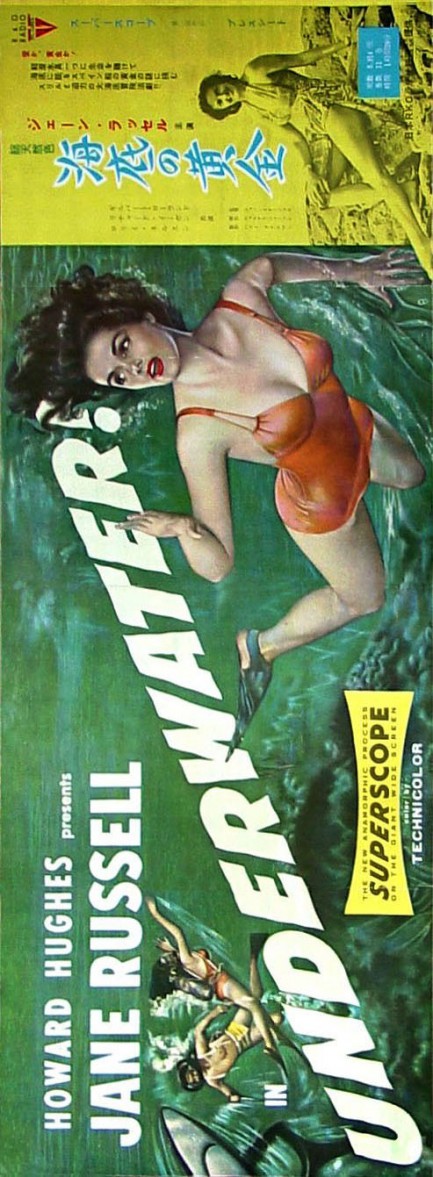
Every once in a while we come across a piece of art so amazing we have to post it rotated in order to ensure that it’s viewable at the largest possible size. In this case, it’s a Japanese promo poster for Jane Russell’s widescreen adventure Underwater!, in which Jane dives in the Caribbean, tries on a Cuban accent (intermittently), dances and flirts island style, and wears a couple of different swimsuits. The film was the brainchild of Howard Hughes, who specialized in thinking of ways to show off Russell’s breasts. We can only assume he shot bolt upright in bed late one night and cried, “Eureka! I’ll make them float!” He succeeded wildly, but in terms of time and treasure he may have gotten in deeper than he planned, since the film took three years and cost three million dollars. The money shows, and in stunning Technicolor, but otherwise Underwater! isn't special. Russell, Gilbert Roland, Lori Nelson, and Richard Egan (looking even more reptilian than usual), team up to salvage a Spanish galleon they believe went down off Cuba with a solid gold statue of the Madonna. If you happen to love Jane Russell, or can't resist Caribbean atmosphere, or are particularly adept at suspension of disbelief, or all three, then give this one a go. For all its flaws, we must confess we liked it. Underwater! premiered in Japan today in 1955.
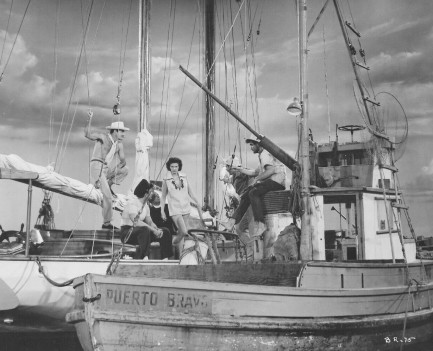 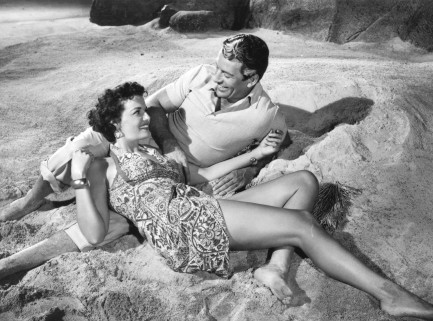 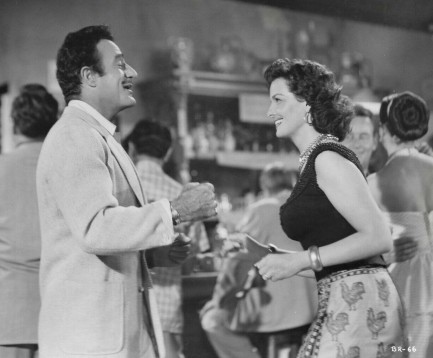 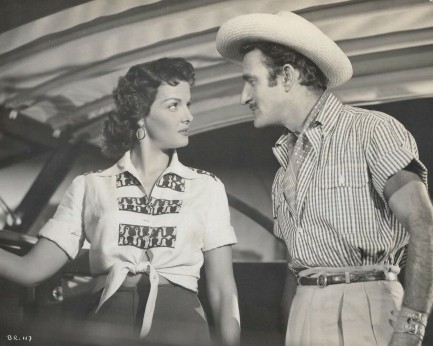 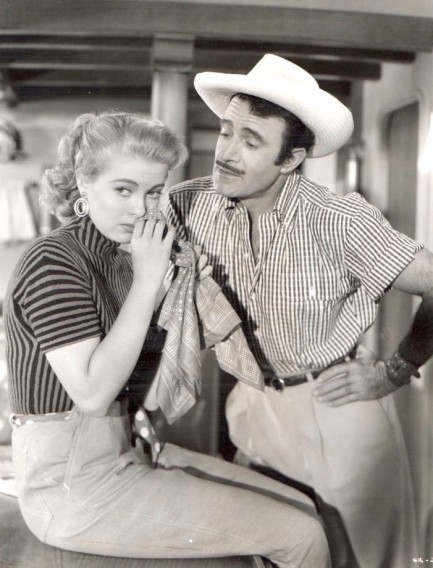 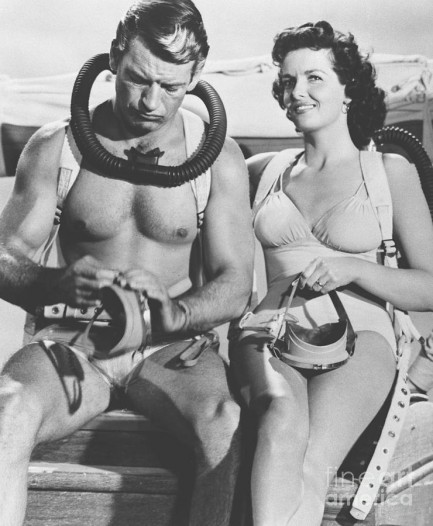 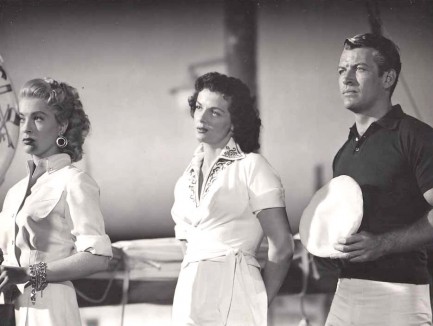 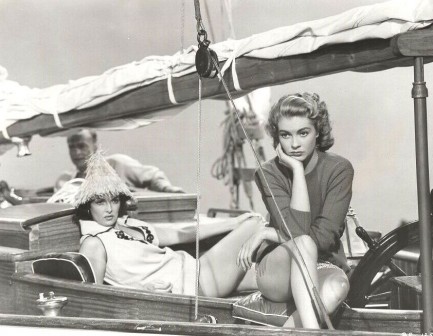 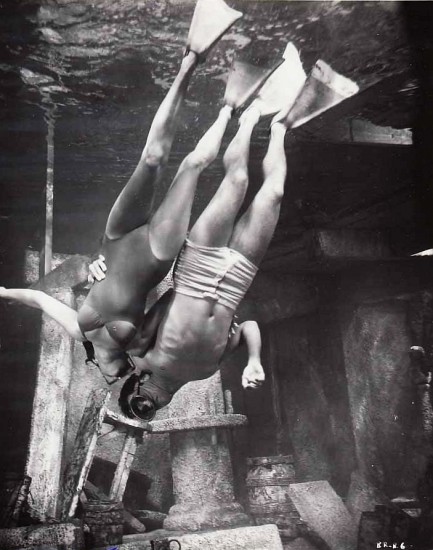 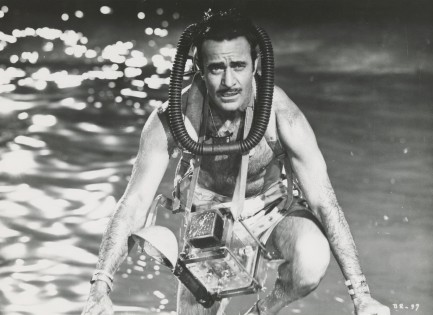 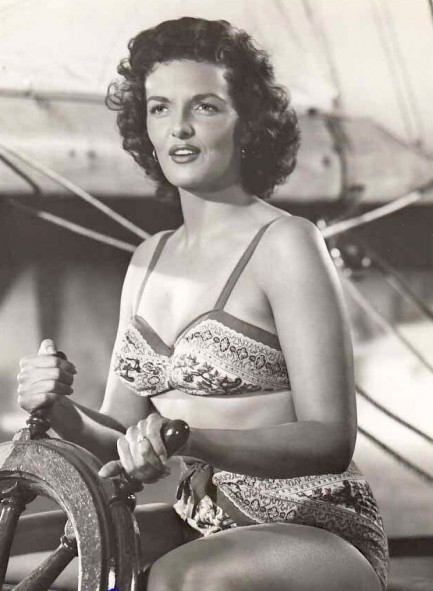 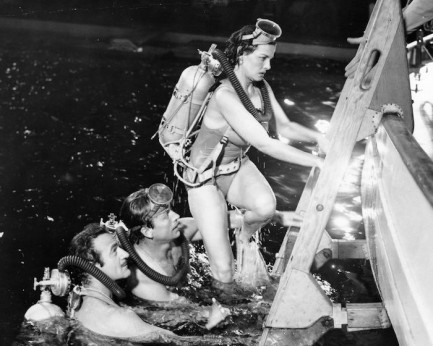 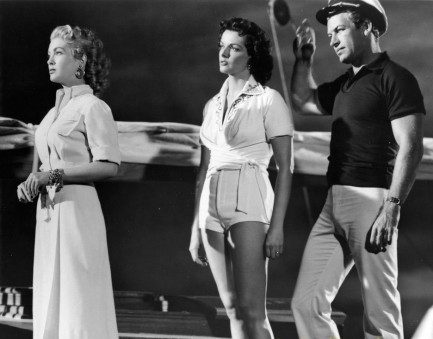 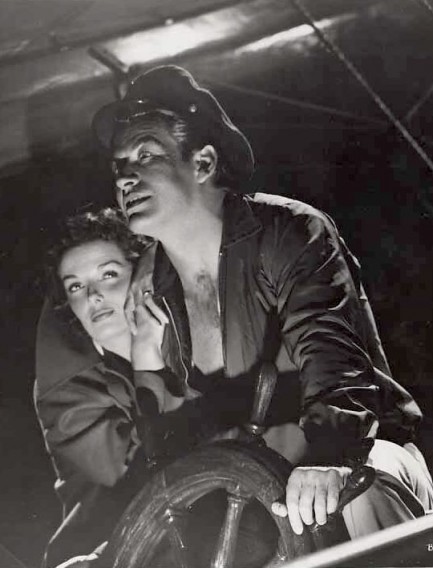
|
 |

The headlines that mattered yesteryear.
2003—Hope Dies
Film legend Bob Hope dies of pneumonia two months after celebrating his 100th birthday. 1945—Churchill Given the Sack
In spite of admiring Winston Churchill as a great wartime leader, Britons elect
Clement Attlee the nation's new prime minister in a sweeping victory for the Labour Party over the Conservatives. 1952—Evita Peron Dies
Eva Duarte de Peron, aka Evita, wife of the president of the Argentine Republic, dies from cancer at age 33. Evita had brought the working classes into a position of political power never witnessed before, but was hated by the nation's powerful military class. She is lain to rest in Milan, Italy in a secret grave under a nun's name, but is eventually returned to Argentina for reburial beside her husband in 1974. 1943—Mussolini Calls It Quits
Italian dictator Benito Mussolini steps down as head of the armed forces and the government. It soon becomes clear that Il Duce did not relinquish power voluntarily, but was forced to resign after former Fascist colleagues turned against him. He is later installed by Germany as leader of the Italian Social Republic in the north of the country, but is killed by partisans in 1945.
|

|
|

It's easy. We have an uploader that makes it a snap. Use it to submit your art, text, header, and subhead. Your post can be funny, serious, or anything in between, as long as it's vintage pulp. You'll get a byline and experience the fleeting pride of free authorship. We'll edit your post for typos, but the rest is up to you. Click here to give us your best shot.

|
|





